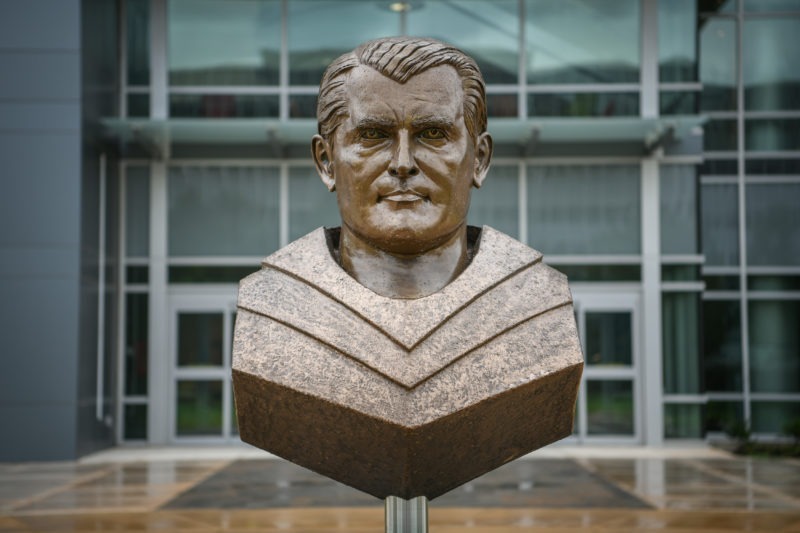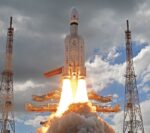Apollo’s legacy: A quiet corner of Alabama that is forever Germany
A bust of Wernher von Braun at NASA’s Marshall Space Flight Center in Huntsville, Alabama (Loren ELLIOTT)
Huntsville (United States) (AFP) – It’s not hard to find schnitzel, a quintessential German dish of breaded cutlets, in Huntsville Alabama, the heart of America’s Deep South.
Every fall, the local military base hosts an Oktoberfest. On Thursdays, the space museum organizes a Biergarten.
And on Tuesday evening, at a dinner celebrating the 50th anniversary of the Apollo 11 mission to the Moon, guests at the Space & Rocket Center munched on bratwurst and Bavarian pretzels.
Klaus Heimburg, Hans Hoelzer and Peter Grau didn’t get tickets and so held their own party at a nearby hotel with dozens of other “second generation Germans”: the children of the engineers and scientists who, after developing V-2 rockets for the Nazis, invented those that took Americans to the Moon.
Their fathers, led by the legendary Wernher von Braun, surrendered themselves to the Americans at the end of the war and were brought to El Paso, Texas under “Operation Paperclip,” a secret Cold War intelligence program to acquire the Third Reich’s best minds.
“You will find that there’s a little bit of a baby boom, between ’48 and ’49. You know, when all the wives came,” smiled Peter Grau, a former telecoms executive himself born in 1949.
They were later sent to Huntsville, then a sleepy farm town known at the time as the “Watercress Capital of the world.”
The army had converted an arsenal into a missile development center. As he had been in Germany, von Braun was boss, and, after NASA was created, became in 1960 the first director of the Marshall Space Flight Center.
“My lunch was dark bread, Americans eat white bread. I would have liverwurst, they would have peanut butter,” remembered Grau, who lives today in Dallas.
His father, Dieter, headed a quality control lab.
Many German families live in the same neighborhood, nicknamed “Sauerkraut hill.”
“We played cowboys and Indians in German,” recalled Klaus Heimburg, the son of Karl Heimburg, who headed up testing. “And, you know, our parents, they dressed me in lederhosen, I was running around in the US in lederhosen.”
Six decades later, the Germans have left their mark on Huntsville: they founded a symphony orchestra, a Von Braun Sports Center, and Von Braun Astronomical Society.
The city has transformed into an aerospatial and technology hub. The genius and charisma of the engineer, who popularized through magazines and television the idea of space exploration in the 1950s, is not contested.
– Sensitivity over the past –
But discussing their past in Germany with a journalist provokes an immediate tension.
About half of von Braun’s team were members of the Nazi party, according to historian Michaeul Neufel, including von Braun himself, who was also recruited by the SS in 1940.
All of their children have the same response: in Hitler’s Germany, you did what you were told, or faced death.
“We’re hyper sensitive to that because it’s our fathers,” said Heimburg. “They’re not sociopaths. They didn’t do evil things. They were caught in the web of war.”
After all, he argues, they worked five years (or more in some cases) for the German forces, and then more than 25 for the US military and later NASA.
Hans Hoelzer, a childhood friend of von Braun’s first daughter Iris, is seated at the same table.
Von Braun probably knew about the slave laborers from the Dora concentration camp, who built the V-2 rockets, he said.
“But I don’t think there was anything he could do about it,” said Hoelzer, who is also an engineer, like many of the second generation.
This defensive posture extends to the local non-German origin Americans. Local NASA historian Brain Odom calls it the “Huntsville school of history.”
“There’s still very much a nearness to all this history,” he said.
The last member of von Braun’s team died last year, and their children remain.
Right in the middle of NASA’s campus sits a stately bust of von Braun that has just been placed here.
A V-2 rocket stands next to von Braun’s original office at the US Space & Rocket Center with no plaque about its provenance — but the museum said it was working to “expand” the exhibition.
According to University of Alabama Huntsville historian Stephen Waring, it was one of those built by the Dora prisoners.
Here, he says “History starts in 1945.”
“Everything was the fault of Adolf Hitler… the German engineers were victims of the SS.”
Mayor Tommy Battle recognizes the sensitivity of the subject.
But he goes back to the same point: thanks to von Braun’s team, it was America that put the first men on the Moon.
“For the first time in history it made Huntsville a place that had done something nobody else had done.”
Disclaimer: Validity of the above story is for 7 Days from original date of publishing. Source: AFP.


